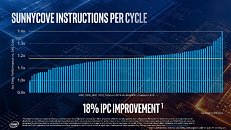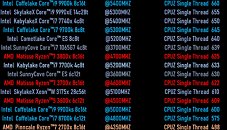Monday, June 17th 2019

Intel "Ice Lake" IPC Best-Case a Massive 40% Uplift Over "Skylake," 18% on Average
Intel late-May made its first major disclosure of the per-core CPU performance gains achieved with its "Ice Lake" processor that packs "Sunny Cove" CPU cores. Averaged across a spectrum of benchmarks, Intel claims a best-case scenario IPC (instructions per clock) uplift of a massive 40 percent over "Skylake," and a mean uplift of 18 percent. The worst-case scenario sees its performance negligibly below that of "Skylake." Intel's IPC figures are derived entirely across synthetic benchmarks, which include SPEC 2016, SPEC 2017, SYSMark 2014 SE, WebXprt, and CineBench R15. The comparison to "Skylake" is relevant because Intel has been using essentially the same CPU core in the succeeding three generations that include "Kaby Lake" and "Coffee Lake."
A Chinese tech-forum member with access to an "Ice Lake" 6-core/12-thread sample put the chip through the CPU-Z internal benchmark (test module version 17.01). At a clock-speed of 3.60 GHz, the "Ice Lake" chip allegedly achieved a single-core score of 635 points. To put this number into perspective, a Ryzen 7 3800X "Matisse" supposedly needs to run at 4.70 GHz to match this score, and a Core i7-7700K "Kaby Lake" needs to run at 5.20 GHz. Desktop "Ice Lake" processors are unlikely to launch in 2019. The first "Ice Lake" processors are 4-core/8-thread chips designed for ultraportable notebook platforms, which come out in Q4-2019, and desktop "Ice Lake" parts are expected only in 2020.
Source:
WCCFTech
A Chinese tech-forum member with access to an "Ice Lake" 6-core/12-thread sample put the chip through the CPU-Z internal benchmark (test module version 17.01). At a clock-speed of 3.60 GHz, the "Ice Lake" chip allegedly achieved a single-core score of 635 points. To put this number into perspective, a Ryzen 7 3800X "Matisse" supposedly needs to run at 4.70 GHz to match this score, and a Core i7-7700K "Kaby Lake" needs to run at 5.20 GHz. Desktop "Ice Lake" processors are unlikely to launch in 2019. The first "Ice Lake" processors are 4-core/8-thread chips designed for ultraportable notebook platforms, which come out in Q4-2019, and desktop "Ice Lake" parts are expected only in 2020.


153 Comments on Intel "Ice Lake" IPC Best-Case a Massive 40% Uplift Over "Skylake," 18% on Average
That means this is against their own policy and clearly irrelevant, no?
Ryzen 3th gen gets 13 points every 100MHz
Intel 9th gen gets 15 points every 100MHz
This "super OMG Ryzen killer" SunnyCove only gets 9 points every 100MHz ?
Numbers don't add up.
Thus the performance uplift is really small.
On the other hand, these new cores definitely have fixes for Meltdown/L1TF in hardware and at least hardware-assisted mitigations for other Spectre-likes. And they are comparing these against Skylake which has none of that. When this is tested without security mitigations, Skylake should get a bigger boost than Ice Lake, making the uplift from new cores even bigger when taking security mitigations into account.I don't know about that. On the other side 13-15% over 3 years is lauded as a great achievement.
"Intel to suppliers: The establishment of the new plant[10nm] is postponed.
As revealed in Calcalist, Intel summoned one of those involved in setting up the factory in Kiryat Gat, one after the other, and announced a delay of at least half a year.
Intel CEO Bob Swan: "We look forward to the new plant"
So whats going on? Intel CEO Bob Swan is currently visiting here, Maybe they have change of plans? going 7nm or other plan?
www.calcalistech.com/ctech/articles/0,7340,L-3764367,00.html
Yea lets hope so, we need healthy competition :-).
Remember when ryzen scored crazy in cpu-z ?... yeah, was a bug in the benchmark :)
I think Ice lake should be Highly competetive in laptops but it's ipc should be marginally better than zen 2.
Reply to above:
7NM doesn't really help Intel with what they're struggling with, Performance.
It should be worse in fact...
Oregon and Israel were the only 2 fabs for 10nm
The first image is from an Intel presentation, using only synthetic benchmarks, whereas when AMD used them during their presentation at Computex, Intel went out and said that from now, we should only use real world benchmarks. Yet Intel clearly seems more than happy to use synthetic benchmarks when it suits them. As such, this is irrelevant even by Intel's "new" standards, no?
Did Intel ever mention 10nm desktop in last 6 months? Dell leaks of roadmaps showed 14 nm desktop well into 2020. If there really will be Rocket Lake 14 nm desktop part with Willow Cove architecture in 2020, 10 nm Ice Lake after that would be a regression...
Some Intel CPU's will have lost more than 50% of their performance under some circumstances, so a poultry 18% (average) improvement on average is simply not enough.
Too little, too late Intel.
Intel will be using Arizona and Ireland for 7nm. Expansion at those fabs is expected to be completed late 2021 for Arizona, Ireland est sometime in 2022.
What Intel needs help with is power efficiency that 10nm/7nm does bring to the table. Smaller dies may be helpful or harmful but we do not know that yet for sure.Intel CPUs with Meltdown and L1TF fixed in hardware are already shipping. No doubt things like MDS will get fixes soon given Intel has been aware of these for almost a year now. It takes about year or year and a half to get fixed CPUs into mass production and out on shelves if this is done in a hurry.This is an old roadmap slide. Newer one shows 10nm quickly replaced with 10+nm and then with 7nm less than a year after. Product roadmap at the same time only has 10nm CPUs for mobile by end of this year and for servers early next year. Desktop does not have anything at 10nm on roadmap.There is about 6% from faster clocks, making the increase by IPC raise 19%. That is feasible enough even if it would mean CPU-Z bench is pretty much the best case scenario for Zen2 (benefitting directly from massive L3 cache maybe).